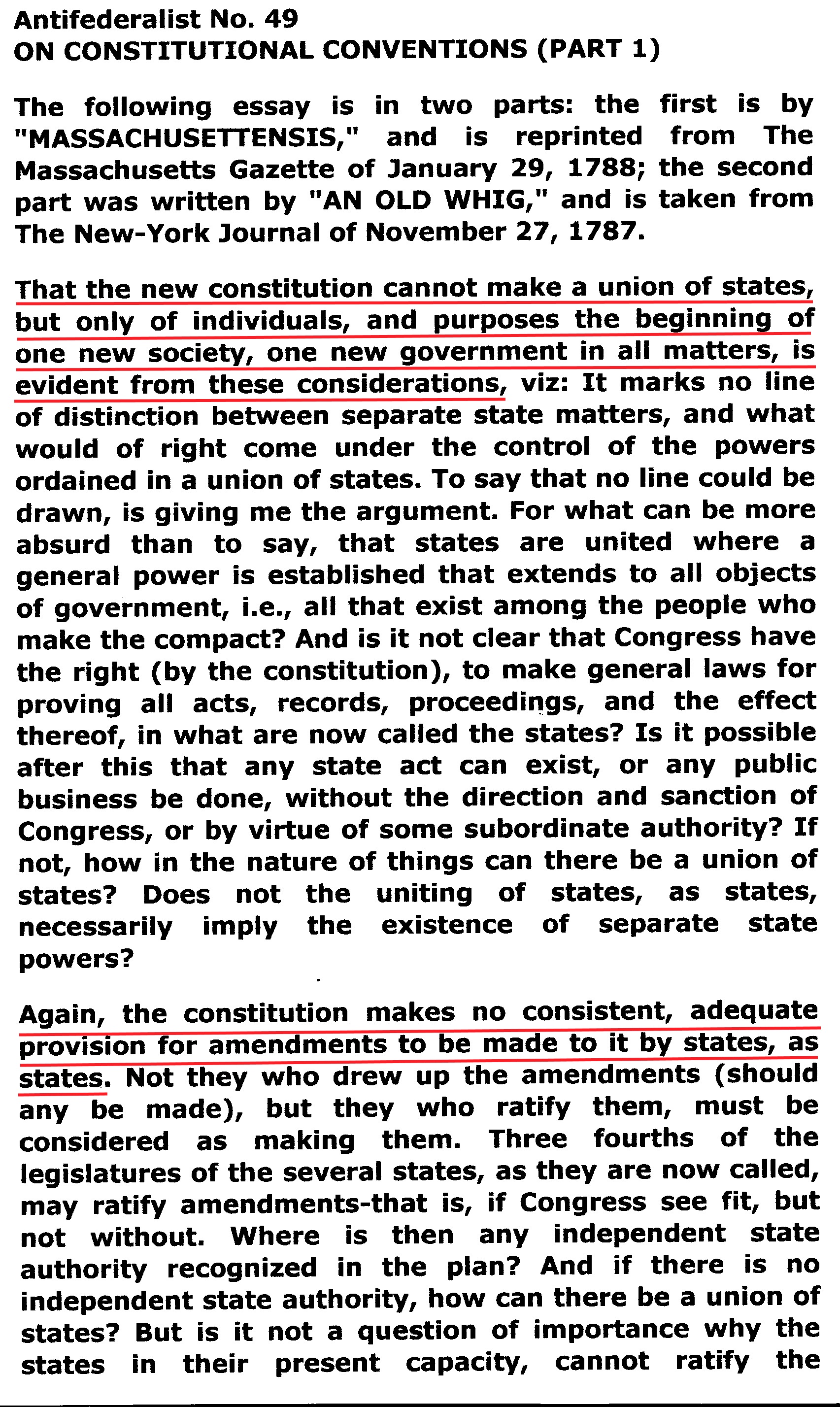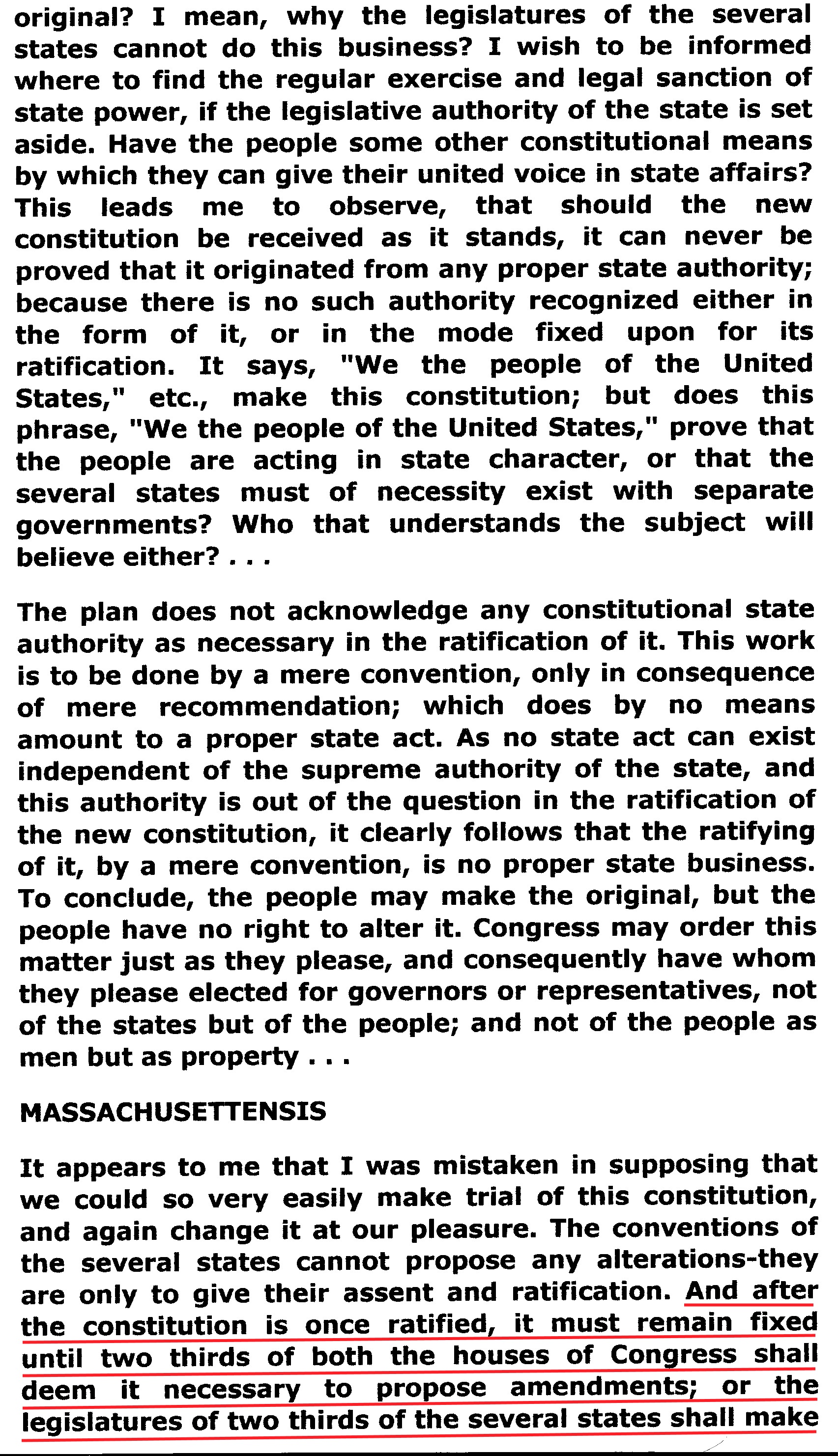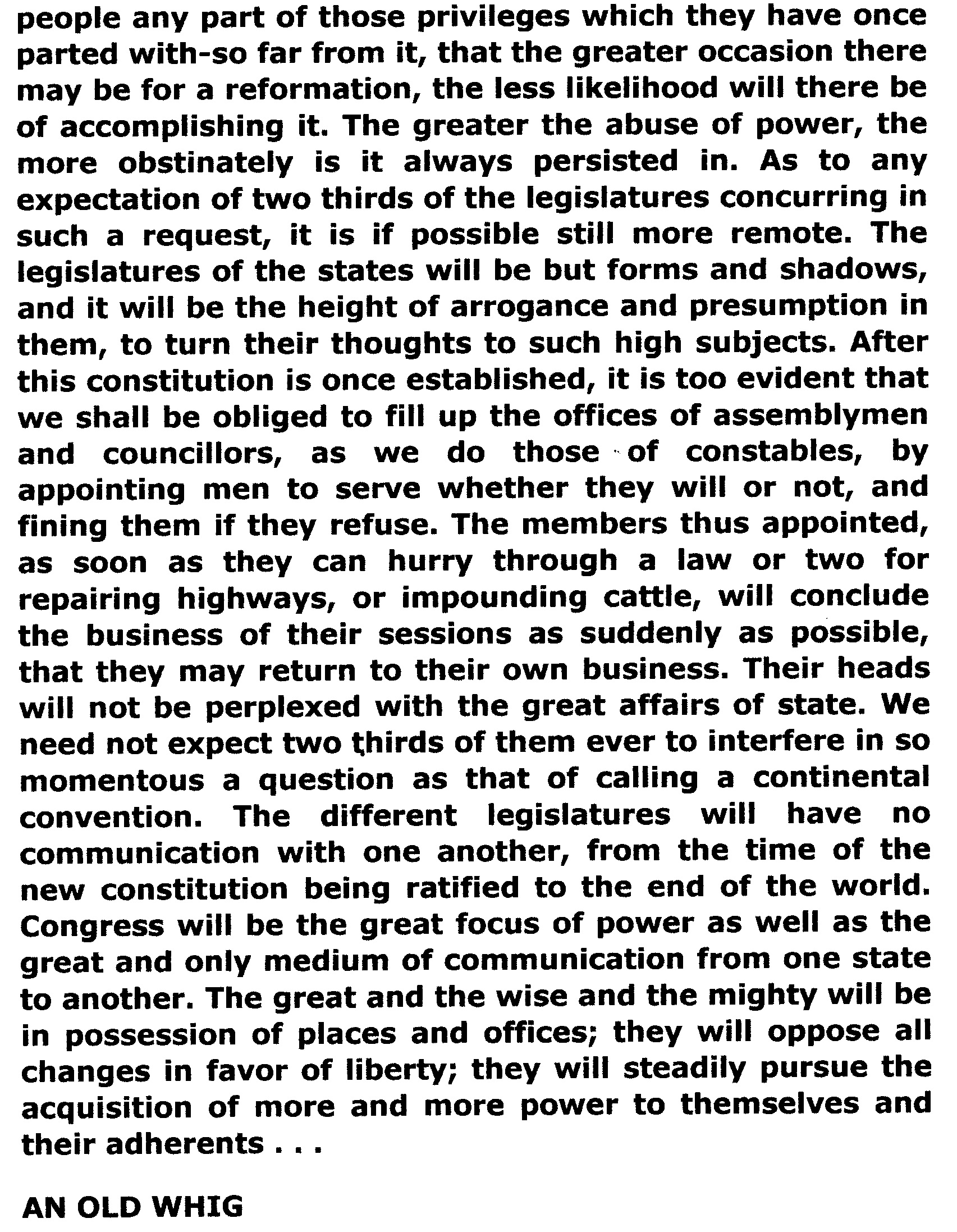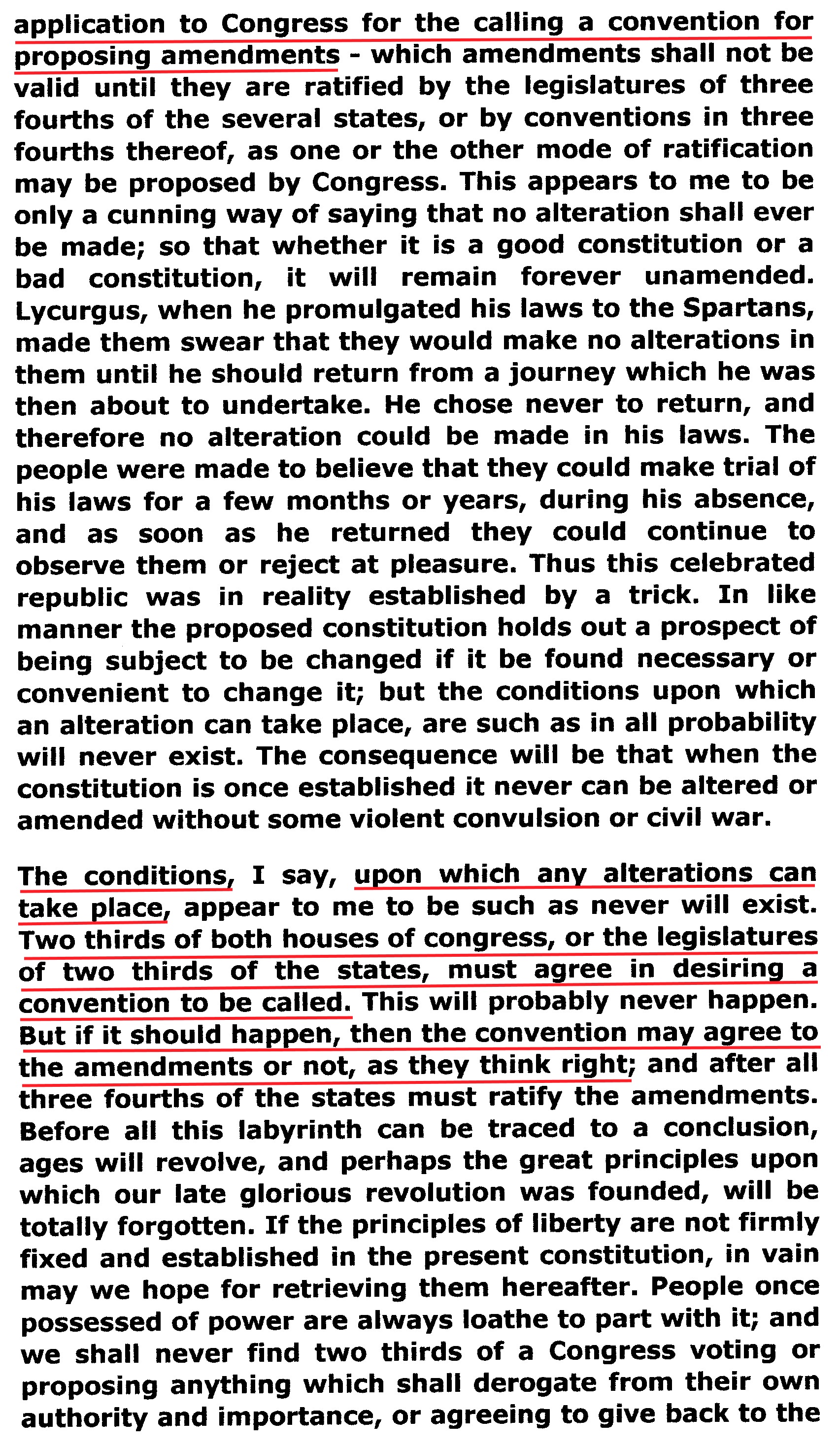Politically, JBS/Eagle Forum advocated "the Constitution should be obeyed as is." This political posturing meant JBS/Eagle Forum could not appear to outright advocate the Constitution be disobeyed (even though by urging a convention not be called when otherwise mandated they were doing exactly that). Thus the JBS/Eagle Forum had to create a pretense to explain why a convention was not yet mandated and thus could be prevented before the terms of the pretense were satisfied. Hence they created "same subject."
These facts explain why JBS/Eagle Forum have always advocated "same subject" as the basis for counting applications but never provided historic legal proof of "same subject" being the basis for counting applications prior to the commencement of their anti-convention campaign. Much like so-called "rescissions" likely JBS/Eagle Forum gave no consideration to whether "same subject" was legal or constitutional (See: Page 6 F Fotheringham Exchange). Ironically, the public record shows this pretense has also be satisfied by the states on at least four occasions (and was already satisfied prior to the start of the JBS/Eagle Forum campaign). Thus, whether by the "numeric" count as intended by the Founders or by the pretense of "same subject" as created by JBS/Eagle Forum, Congress is obligated to call a series of Article V Conventions.
The historic record supporting the "numeric" count of state applications for a convention call dates back to the records of the 1787 convention. James Madison and Alexander Hamilton who authored and seconded respectively what became the final version of Article V at the 1787 Convention both addressed the convention clause in great detail. Hamilton succinctly described the convention procedure, the obligation of Congress to call a convention and the basis for such obligation in Federalist 85 (published August 13, 1788). Madison discussed the procedure, obligation and basis for a convention call in Congress on May 5, 1789.
Excerpt from Federalist 85
 "In
opposition to the probability of subsequent amendments, it has been
urged that the persons delegated to the administration of the national
government will always be disinclined to yield up any portion of the
authority of which they were once possessed. For my own part I
acknowledge a thorough conviction that any amendments which may, upon
mature consideration, be thought useful, will be applicable to the
organization of the government, not to the mass of its powers; and on
this account alone, I think there is no weight in the observation just
stated. I also think there is little weight in it on another account.
The intrinsic difficulty of governing THIRTEEN STATES at any rate,
independent of calculations upon an ordinary degree of public spirit
and integrity, will, in my opinion constantly impose on the national
rulers the necessity of a spirit of accommodation to the reasonable
expectations of their constituents. But there is yet a further
consideration, which proves beyond the possibility of a doubt, that the
observation is futile. It is that the national rulers, whenever nine States concur, will have no option upon the subject.
By the fifth article of the plan, the Congress will be obliged "on the
application of the legislatures of two thirds of the States [which at
present amount to nine], to call a convention for proposing amendments,
which shall be valid, to all intents and purposes, as part of the
Constitution, when ratified by the legislatures of three fourths of the
States, or by conventions in three fourths thereof." The words of this
article are peremptory. The Congress "shall call a convention." Nothing
in this particular is left to the discretion of that body. [Emphasis added]. And
of consequence, all the declamation about the disinclination to a
change vanishes in air. Nor however difficult it may be supposed to
unite two thirds or three fourths of the State legislatures in
amendments which may affect local interests, can there be any room to
apprehend any such difficulty in a union on points which are merely
relative to the general liberty or security of the people. We may
safely rely on the disposition of the State Legislatures to erect
barriers against the encroachments of the national authority.
"In
opposition to the probability of subsequent amendments, it has been
urged that the persons delegated to the administration of the national
government will always be disinclined to yield up any portion of the
authority of which they were once possessed. For my own part I
acknowledge a thorough conviction that any amendments which may, upon
mature consideration, be thought useful, will be applicable to the
organization of the government, not to the mass of its powers; and on
this account alone, I think there is no weight in the observation just
stated. I also think there is little weight in it on another account.
The intrinsic difficulty of governing THIRTEEN STATES at any rate,
independent of calculations upon an ordinary degree of public spirit
and integrity, will, in my opinion constantly impose on the national
rulers the necessity of a spirit of accommodation to the reasonable
expectations of their constituents. But there is yet a further
consideration, which proves beyond the possibility of a doubt, that the
observation is futile. It is that the national rulers, whenever nine States concur, will have no option upon the subject.
By the fifth article of the plan, the Congress will be obliged "on the
application of the legislatures of two thirds of the States [which at
present amount to nine], to call a convention for proposing amendments,
which shall be valid, to all intents and purposes, as part of the
Constitution, when ratified by the legislatures of three fourths of the
States, or by conventions in three fourths thereof." The words of this
article are peremptory. The Congress "shall call a convention." Nothing
in this particular is left to the discretion of that body. [Emphasis added]. And
of consequence, all the declamation about the disinclination to a
change vanishes in air. Nor however difficult it may be supposed to
unite two thirds or three fourths of the State legislatures in
amendments which may affect local interests, can there be any room to
apprehend any such difficulty in a union on points which are merely
relative to the general liberty or security of the people. We may
safely rely on the disposition of the State Legislatures to erect
barriers against the encroachments of the national authority.If the foregoing argument is a fallacy, certain it is that I am myself deceived by it, for it is, in my conception, one of those rare instances in which a political truth can be brought to the test of a mathematical demonstration. [Emphasis added]. Those who see the matter in the same light with me, however zealous they may be for amendments, must agree in the propriety of a previous adoption, as the most direct road to their own object."




